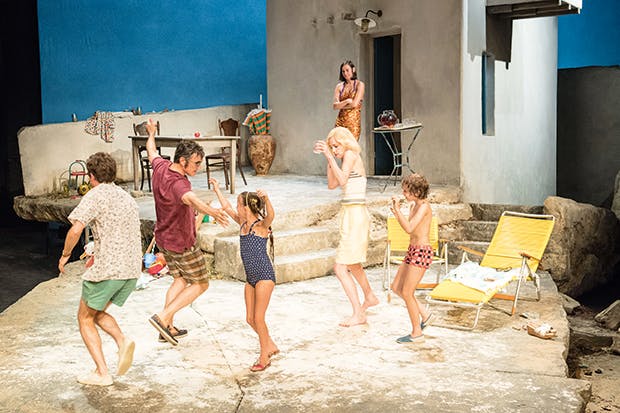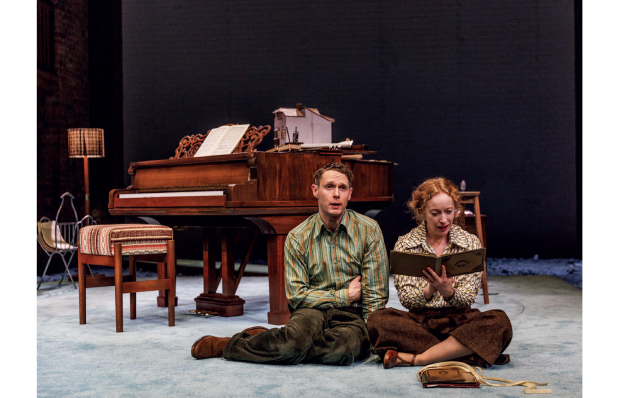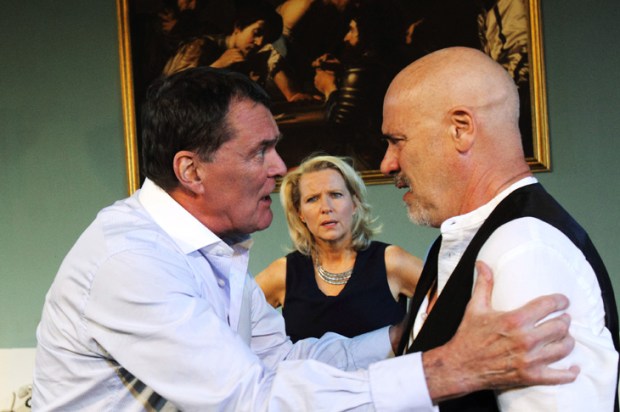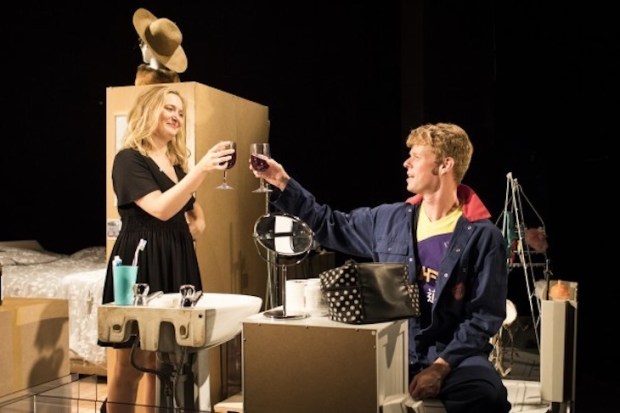Bertolt Brecht took The Threepenny Opera from an 18th-century script by John Gay and relocated it to Victorian London. This National Theatre version wants to straddle the contemporary and the antique. Mack the Knife, an Afghan war veteran who murders strangers, contracts a bigamous marriage with Polly Peachum, the daughter of a cross-dressing mastermind who runs begging gangs across east London.
This laborious set-up takes an hour to establish and the drama gets started only when Polly’s mum vows to rub out Mack at a knocking-shop. A wise dramatist would have placed this threat in the opening scene. But Brecht isn’t a wise dramatist; he’s a preachy one and his purpose is to show that all human sin derives from the profit motive. Getting a handle on this rowdy, overconfident production is a struggle. Vicki Mortimer’s design can’t decide which decade to confuse with which. Mack, and lots of other characters, wear Roaring Twenties gear but the London police chief (leather greatcoat, holstered pistol) looks like a Gestapo officer from the 1930s while his capering constabulary wear the tunics and helmets of Edwardian bobbies. Quite a muddle.
The moral atmosphere feels puerile and dated. Who today would consider a serial killer a charming daredevil? We no longer regard beggars as decorative, swindling desperados. And our attitude to misogyny has developed since Brecht’s time. Polly makes her first appearance being raped, it would seem, on her wedding night. Later, a tied-up prostitute has her digits broken by a chortling sadist. The scene is played for laughs, of course, as is a sketch involving a line of madmen in straitjackets howling and shrieking for our amusement. The pageant unfolds with relentless nastiness enlivened by the odd song full of tedious swearing. Mack’s character makes no sense. He has two personalities, the street prowler who kills for fun, and the placid suburban husband who visits hookers on the side.
Brecht hasn’t bothered to join the dots between the two and his portrait reveals nothing about the criminal mindset. The poor old sausage died in 1956 when it was still possible to believe that Marxism might defeat the free market. It didn’t. But his work rests entirely on the proposition not only that his philosophy will triumph but that it must. Which makes his opus a wearing experience. One approaches a playwright in order to be cheered, thrilled and enlightened by his spirit and intellect. But Brecht is like a garrulous dunce spoiled by his parents into believing that zero is the top mark. I expect this is the last century in which his work will be performed.
Highly revealing, play titles. Sunset at the Villa Thalia (verbose yet uninformative) says it all. We’re on Skiathos in 1967 and two British nitwits are renting a shack for their hols. Charlotte is a priggish guilt-bucket married to Theo, a brain-free script-writer, and the pair are being stalked by two boorish American drifters. June is a whisky-soaked airhead (played for big laughs by Elizabeth McGovern), hitched to a loudmouth from the CIA named Harvey (Ben Miles, superbly watchable, effortlessly dominant). This cumbersome storyline takes a weird twist when Harvey starts to bully the British nits into buying the holiday hovel from its owners. Two gnarled rustics shuffle on stage and jabber quaintly about emigrating to ‘the Sydney’.
The script is bedevilled by hidden faultlines. A fascist coup interrupts the action. Harvey claims he was warned of it in advance and yet this knowledge seems to compromise, albeit in baffling ways, his eagerness to make the Brit nits buy the property. When the desperate owners cut the price by 10,000 drachmas, the Brit nits say no, please let’s pay extra so we can gazump ourselves. The Brit nits fret about the morality of buying a bolthole in a fascist dictatorship. They then proceed to buy a bolthole in a fascist dictatorship.
The second act is greatly lightened by the arrival of two charmingly truculent children. That apart, little has changed. Thepolyfilla characters are as stodgy as ever and the plot remains obsessed with land deals. Will boring Theo and whiny Charlotte flip their newly refurbished shack and trade up to Cornwall? Will motormouth Harvey and his near-legless wife — who are still stalking them after nine years— feel a bit betrayed? Little else happens in this lavish production, which boasts a 13-strong company including two ornamental peasants and six child actors who require chaperones during rehearsals and at each performance.
If you’re among the millions of Brits who own Aegean ranches and who fear that ancient genealogies of noble Hellenes have been evicted by your cut-throat speculation, this play will delight you. But if you’re one of the few without an overseas real-estate portfolio you should look elsewhere for your kicks.
Got something to add? Join the discussion and comment below.
Get 10 issues for just $10
Subscribe to The Spectator Australia today for the next 10 magazine issues, plus full online access, for just $10.














Comments
Don't miss out
Join the conversation with other Spectator Australia readers. Subscribe to leave a comment.
SUBSCRIBEAlready a subscriber? Log in